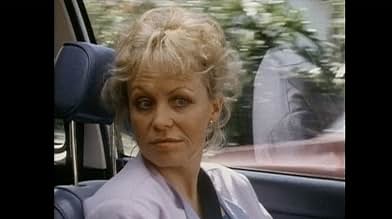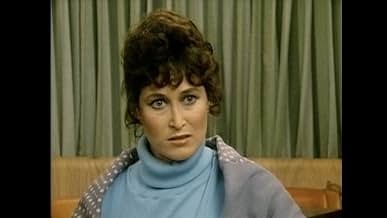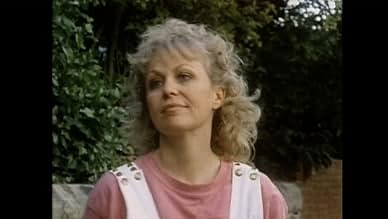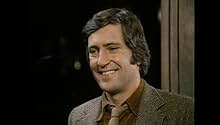Barbara and Steward are happily married and have three kids. But one day Barbara decides that her children are old enough now and she can quit as housewife and start to study. Against the wi... Read allBarbara and Steward are happily married and have three kids. But one day Barbara decides that her children are old enough now and she can quit as housewife and start to study. Against the will of her husband she employs babysitter Eric while she attends university. Steward reacts... Read allBarbara and Steward are happily married and have three kids. But one day Barbara decides that her children are old enough now and she can quit as housewife and start to study. Against the will of her husband she employs babysitter Eric while she attends university. Steward reacts increasingly nervous about the presence of another man in his family and brings their mar... Read all
- Awards
- 1 win
- Lecturer
- (as Steven Jacobs)
- Business Executive
- (uncredited)
Storyline
Did you know
- TriviaOne of four David Williamson written feature films starring Australian actress Jacki Weaver. The films are Stork (1971), Petersen (1974), The Perfectionist (1985) and The Removalists (1975).
- ConnectionsFeatures Dinky Dog (1978)
Chris Thomson for this comedic skit. Williamson, perhaps currently Australia's most prominent and prolific dramatist, also worked on Peter Weir's hugely influential `Gallipoli' with Russell Boyd, the same cinematographer as here and in Weir's latest Hollywood triumph in `Master and Commander'. The playwright is also responsible for last year's simultaneous productions in Sydney and London (his first West End production in thirteen years) of `Soulmates', with Jacki Weaver, also the femme fatale of this film, and Up For Grabs with Madonna. Thomson is a veteran of many TV series from the groundbreaking Aussie outback medical drama `The Flying Doctors' to the American family western `Ponderosa' in 2001, the remake of `Bonanza', and his `1915' miniseries made in 1982 is as much a tribute to the Australian spirit and comradeship as Weir's `Gallipoli', a comparable First World War drama of a year earlier.
The perfectionist of the play's title refers to the husband's obsession with getting his economic thesis absolutely right before publication only to find he is beaten by events, thereby wasting nine years work. Presumably we are meant to take the message that as this world is imperfect and life is ephemeral, then getting your work done and out there is more important than achieving perfection? Of course in every walk of life there will always be critics to challenge either approach, as Williamson knows only too well, as exemplified by his attempt to address his issues with critics in his literary satire `Soulmates'. This leaves the impossible dilemma between expediency and perfection, to which the only possible solution has to be to rely on our personal intuition.
Appealing in a bubbly-blonde Goldie Hawn type of way, to whom she is oft compared, Jacki Weaver (Picnic at Hanging Rock) is finely cast as the wife fed up with being sidelined by her husband and easily attracts Eric (Steven Vidler, `Two Hands'), the Swedish home help. Ironically, Eric was hired by Mrs Gunn to help with the chores to provide her with the space and time for her own studies but soon Eric is helping Barbara out in other ways until he is dismissed by the jealous husband. Stuart's subsequent attempts at more hands-on-fathering seek to distance the mother further until fate throws her into the path of Eric once more. The dilemma for a mother of leaving her children behind seems to be far too easily resolved as Barbara moves in with Erik, who may be a refreshing change but is hardly soul mate material worthy of sacrificing your life for. Eventually Barbara sees what may be obvious on the basis of these characterisations, as with passion muted and unconvincing we fail to see how her heart can possibly be torn. Barbara's dilemmas are a world away from those of the tragic Hester Collyer in Terrence Rattigan's `The Deep Blue Sea' as Barbara drifts back into the world she left behind. Accepting the differences in time and place of Rattigan's London circa 1952 and Williamson's Sydney circa 1987, I could believe in Hester's love as delineated by Vivean Leigh in the film version, and Harriet Walter recently on stage in the UK, but this conviction is absent in Barbara's case. Not for her is her world blown apart, as her counterpart Hester abandons her lawyer husband and the associated comfortable and privileged life for a passionate affaire de coeur with an ex-RAF pilot only to find that he can't reciprocate her way of loving. Barbara on the other hand can't bring herself to leave everything behind as the realisation dawns on her that Eric is not worthy of the disruptive distress. Dante's `Inferno' from `The Divine Comedy' may have attributed the second circle of Hell to adulterers and told of the agonies suffered by the poor souls who enter there, but Barbara for all her intellectual aspirations is blissfully ignorant of this consideration. As a result, in `Three's Trouble' a wealth of issues are glossed over as the story comes full circle and normality is restored.
Of the rest of the cast, John Waters (`Breaker Morant') ably portrays the studious but intellectually arrogant husband, who sees his life as more important than the rest of his family's. His character's development is wholly believable given the role models set by his mother (Jennifer Claire), an alcoholic unfulfilled actress, and his father (Noel Ferrier, `The Year of Living Dangerously'), an ambitious dominating lawyer, who affirm that their son's failure is character building and but a blip on the career of a university medal winner. As the oldest child, the young Shaun Gunn (Adam Willits) is easily recognisable as the future Stephen Matheson, a stalwart of `Home and Away' both as pupil and teacher at Summer Bay High over the past decade.
Some critics might be moved to sum up this frothy piece of eighties' indulgence with the egregious assumption of as much originality as went into the making of the film, but that would be to fail to recognise that all art has its place, and in its time it may have appeared perfectly charming. There is a very strong tradition of capturing the Australian's distinctive humour on celluloid for its relatively small industry but not all of its efforts dazzle, as was testified by this year's eleven with disappointing performances at the box office. They represented about half of the total output for 2003 in an especially meagre year with foreign investment at an all time low, down from $57 million to $4.5 million. To actually achieve both artistic and commercial success is the ever-elusive Holy Grail for Australian comedies, as glimpsed by the likes of `Strictly Ballroom' and `Muriel's Wedding', and whilst it may not be found here `Three's Trouble's' efforts can still be considered to help further the cause.
- Filmtribute
- Dec 6, 2003
- Permalink
Details
- Runtime1 hour 33 minutes
- Color
Contribute to this page














